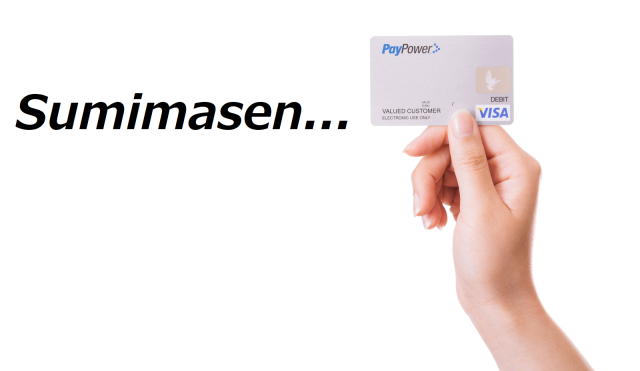
Online commenters have a strong reaction to textbook’s advice, but there might be another angle to consider.
Japanese etiquette has a reputation for being extremely complex, but honestly, a lot of it is based on common sense. It’s just important to remember that one of the primary goals in interpersonal reactions in Japan is to not cause trouble for others.
Where things get tricky, though, is in imagining all the possible ways your actions could make someone else’s day more difficult. For example, Japanese Twitter user @tenana_p recently came across this piece of manners advice in a textbook.
これ、簿記の教科書に載ってたんだけど、こんなマナーあったんだ…ってびっくりしちゃった。マナー評論家のよんてんごぴーさんに解説してほしい。 pic.twitter.com/VAkfJDHqmB
— ぷらむ (@tenana_p) January 29, 2020
The advice reads:
“When using a credit card, say ‘Excuse me’
As we’ve learned, when a credit card is used, it has a negative effect on the store’s revenue. Because of that, when using a credit card, it’s good manners to say ‘Excuse me, but can I pay with a credit card?’”
The “negative effect on revenue” seems to be a reference to the processing fees credit card companies charge businesses, and the specific Japanese phrase the book recommends is sumimasen, which can also be used to mean “I’m sorry.”
Now it’s definitely true that communication in Japan involves a lot of apologizing (the Japanese language has several different phrases that all translate approximately to “I’m sorry” in English). However, @tenana_p was still startled to see paying with a credit card being designated as something that requires a verbal act of contrition, and so were other commenters, whose reactions included:
“Never heard that one before.”
“Why should the customer have to apologize for buying something from the store?”
“I really don’t think the part-timer working the register cares one way or another about the store having to pay processing fees.”
“That advice feels like it’s from 30 years ago, back when most people only used credit cards to make large purchases.”
“If it’s such a big hit to their revenue, then they should just say they only accept cash.”
▼ Note: The book’s advice should also not be interpreted to mean you should say “YOU’RE WELCOME!” when paying with cash.
However, are a collection of laymen’s opinions enough to overturn the judgement of an etiquette expert? Maybe, maybe not…but in this case it may not be an etiquette expert they’re up against. The book @tenana_p was reading isn’t a guide to refined manners, but actually one on the principles of bookkeeping, which is why it takes it as a given that the reader is already aware of credit card transaction fees, and also consciously thinking about them from a sellers’ perspective.
Between the source of the advice and the online reaction to it, it’s pretty safe to conclude that most shops in Japan aren’t going to expect an apology from you for hurting their bottom line if you reach for your credit card instead of cash when it’s time to pay. That said, there’s still a reason or two why a sumimasen is classy when using a credit card.
If the cashier has to scan your card or otherwise do some sort of register manipulation to complete the sale, it’s a bit of extra work for them, and also slows down the transaction, which could leave them with a longer line of customers waiting behind you, and thus a bit more pressure to work extra quickly to take care of them once they’re finished with you.
None of that is by any means outside the tasks a cashier should logically expect to perform during a day at work, but all the same, a quick sumimasen is still a nice gesture, especially since the phrase also carries a connotation of “thank you.”
Source: Twitter/@tenana_p via Jin
Top image: Pakutaso (edited by SoraNews24)
Insert image: Pakutaso
● Want to hear about SoraNews24’s latest articles as soon as they’re published? Follow us on Facebook and Twitter!
There’s no need to apologize for following Casey on Twitter.


 Anime about nasty contract surprises gets real-life credit card with nasty contract surprises
Anime about nasty contract surprises gets real-life credit card with nasty contract surprises Hornets: The perfect pet for people living in Japan?
Hornets: The perfect pet for people living in Japan? Meow-meow but no flush-flush? What’re these cats doing on highway rest stop toilets in Japan?
Meow-meow but no flush-flush? What’re these cats doing on highway rest stop toilets in Japan? Tokyo clerk arrested for memorizing over 1,300 customers’ credit card info, using it online
Tokyo clerk arrested for memorizing over 1,300 customers’ credit card info, using it online “Be a blank slate”: The way to get hired in Japan?
“Be a blank slate”: The way to get hired in Japan? Red light district sushi restaurant in Tokyo shows us just how wrong we were about it
Red light district sushi restaurant in Tokyo shows us just how wrong we were about it Japan’s massive matcha parfait weighs 6 kilos, contains hidden surprises for anyone who eats it
Japan’s massive matcha parfait weighs 6 kilos, contains hidden surprises for anyone who eats it Sandwiches fit for a sumo served up in Osaka【Taste Test】
Sandwiches fit for a sumo served up in Osaka【Taste Test】 Tokyo Tsukiji fish market site to be redeveloped with 50,000-seat stadium, hotel, shopping center
Tokyo Tsukiji fish market site to be redeveloped with 50,000-seat stadium, hotel, shopping center Historical figures get manga makeovers from artists of Spy x Family, My Hero Academia and more
Historical figures get manga makeovers from artists of Spy x Family, My Hero Academia and more Limited-edition Carbonara Udon will anger noodle purists and pasta lovers 【Taste test】
Limited-edition Carbonara Udon will anger noodle purists and pasta lovers 【Taste test】 French Fries Bread in Tokyo’s Shibuya becomes a hit on social media
French Fries Bread in Tokyo’s Shibuya becomes a hit on social media Pokémon Sleep camping suite and guestrooms coming to Tokyo Hyatt along with giant Snorlax burgers
Pokémon Sleep camping suite and guestrooms coming to Tokyo Hyatt along with giant Snorlax burgers McDonald’s new Happy Meals offer up cute and practical Sanrio lifestyle goods
McDonald’s new Happy Meals offer up cute and practical Sanrio lifestyle goods Celebrate another year of life by putting it in jeopardy with this birthday candle flower
Celebrate another year of life by putting it in jeopardy with this birthday candle flower Japanese ramen restaurants under pressure from new yen banknotes
Japanese ramen restaurants under pressure from new yen banknotes All-you-can-drink Starbucks and amazing views part of Tokyo’s new 170 meter-high sky lounge
All-you-can-drink Starbucks and amazing views part of Tokyo’s new 170 meter-high sky lounge Studio Ghibli releases new action figures featuring Nausicaä of the Valley of the Wind characters
Studio Ghibli releases new action figures featuring Nausicaä of the Valley of the Wind characters New private rooms on Tokaido Shinkansen change the way we travel from Tokyo to Kyoto
New private rooms on Tokaido Shinkansen change the way we travel from Tokyo to Kyoto Studio Ghibli glasses cases let anime characters keep an eye on your spectacles
Studio Ghibli glasses cases let anime characters keep an eye on your spectacles Beautiful Ghibli sealing wax kits let you create accessories and elegant letter decorations【Pics】
Beautiful Ghibli sealing wax kits let you create accessories and elegant letter decorations【Pics】 Studio Ghibli releases Kiki’s Delivery Service chocolate cake pouches in Japan
Studio Ghibli releases Kiki’s Delivery Service chocolate cake pouches in Japan New definition of “Japanese whiskey” goes into effect to prevent fakes from fooling overseas buyers
New definition of “Japanese whiskey” goes into effect to prevent fakes from fooling overseas buyers Our Japanese reporter visits Costco in the U.S., finds super American and very Japanese things
Our Japanese reporter visits Costco in the U.S., finds super American and very Japanese things Studio Ghibli unveils Mother’s Day gift set that captures the love in My Neighbour Totoro
Studio Ghibli unveils Mother’s Day gift set that captures the love in My Neighbour Totoro New Japanese KitKat flavour stars Sanrio characters, including Hello Kitty
New Japanese KitKat flavour stars Sanrio characters, including Hello Kitty More foreign tourists than ever before in history visited Japan last month
More foreign tourists than ever before in history visited Japan last month New Pokémon cakes let you eat your way through Pikachu and all the Eevee evolutions
New Pokémon cakes let you eat your way through Pikachu and all the Eevee evolutions Sales of Japan’s most convenient train ticket/shopping payment cards suspended indefinitely
Sales of Japan’s most convenient train ticket/shopping payment cards suspended indefinitely Sold-out Studio Ghibli desktop humidifiers are back so Totoro can help you through the dry season
Sold-out Studio Ghibli desktop humidifiers are back so Totoro can help you through the dry season Japanese government to make first change to romanization spelling rules since the 1950s
Japanese government to make first change to romanization spelling rules since the 1950s Ghibli founders Toshio Suzuki and Hayao Miyazaki contribute to Japanese whisky Totoro label design
Ghibli founders Toshio Suzuki and Hayao Miyazaki contribute to Japanese whisky Totoro label design Doraemon found buried at sea as scene from 1993 anime becomes real life【Photos】
Doraemon found buried at sea as scene from 1993 anime becomes real life【Photos】 Tokyo’s most famous Starbucks is closed
Tokyo’s most famous Starbucks is closed One Piece characters’ nationalities revealed, but fans have mixed opinions
One Piece characters’ nationalities revealed, but fans have mixed opinions We asked a Uniqlo employee what four things we should buy and their suggestions didn’t disappoint
We asked a Uniqlo employee what four things we should buy and their suggestions didn’t disappoint Princesses, fruits, and blacksmiths: Study reveals the 30 most unusual family names in Japan
Princesses, fruits, and blacksmiths: Study reveals the 30 most unusual family names in Japan From lotus root to alcohol: Are powdered foods the next big boom in Japan?
From lotus root to alcohol: Are powdered foods the next big boom in Japan? Is it OK to put other food on top of your white rice when eating in Japan?
Is it OK to put other food on top of your white rice when eating in Japan? Could Pen-Pineapple-Apple-Pen be the start of a new form of workplace harassment in Japan?
Could Pen-Pineapple-Apple-Pen be the start of a new form of workplace harassment in Japan? Are Women-Only train cars illegal in Japan?
Are Women-Only train cars illegal in Japan? Japan Airlines adds a dash of magic to promote its new credit card【Video】
Japan Airlines adds a dash of magic to promote its new credit card【Video】 Travel tip: McDonald’s Japan will finally let you pay for your food with a credit card
Travel tip: McDonald’s Japan will finally let you pay for your food with a credit card Heroic Japanese convenience store owner saves foreigner from online scam artist
Heroic Japanese convenience store owner saves foreigner from online scam artist Half of Tokyo’s universities to use credits to “convince” students to volunteer in 2020 Olympics
Half of Tokyo’s universities to use credits to “convince” students to volunteer in 2020 Olympics Over 50 percent of single Japanese women in their 20s struggle to make ends meet, survey says
Over 50 percent of single Japanese women in their 20s struggle to make ends meet, survey says Lawson begins first self-service convenience store in Tokyo, no line-ups necessary
Lawson begins first self-service convenience store in Tokyo, no line-ups necessary Two incredibly important phrases to remember when shopping in Japan
Two incredibly important phrases to remember when shopping in Japan Buying Japanese concert tickets may get even harder for foreign tourists with new government plan
Buying Japanese concert tickets may get even harder for foreign tourists with new government plan Pokémon Center superstores won’t sell new Pokémon cards in-store, but will it stop scalpers?
Pokémon Center superstores won’t sell new Pokémon cards in-store, but will it stop scalpers?
Leave a Reply